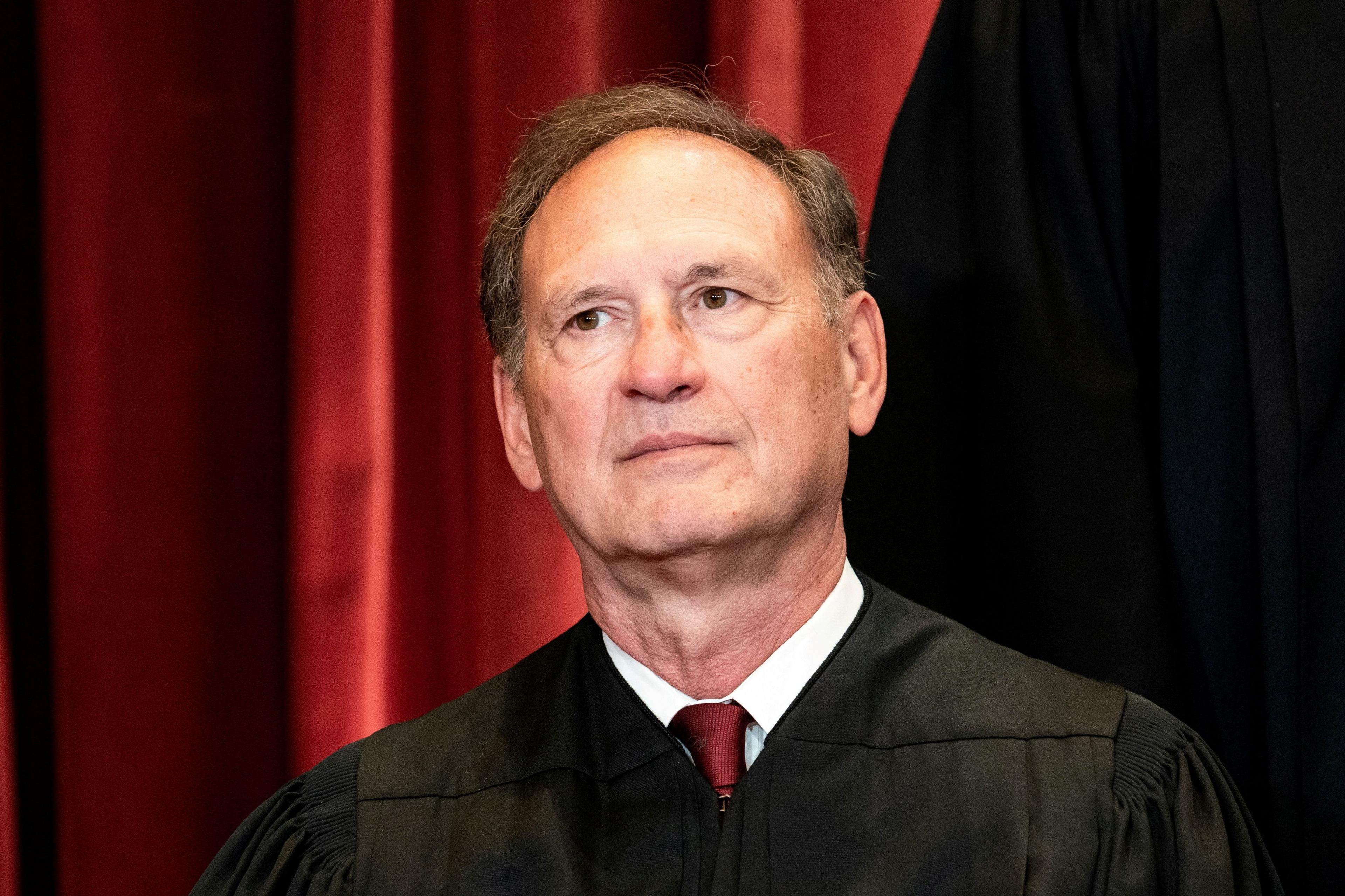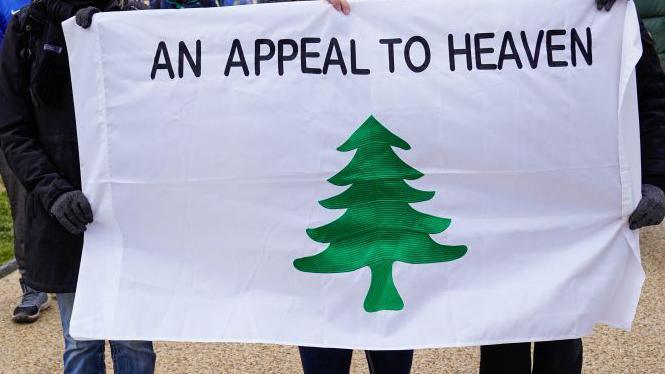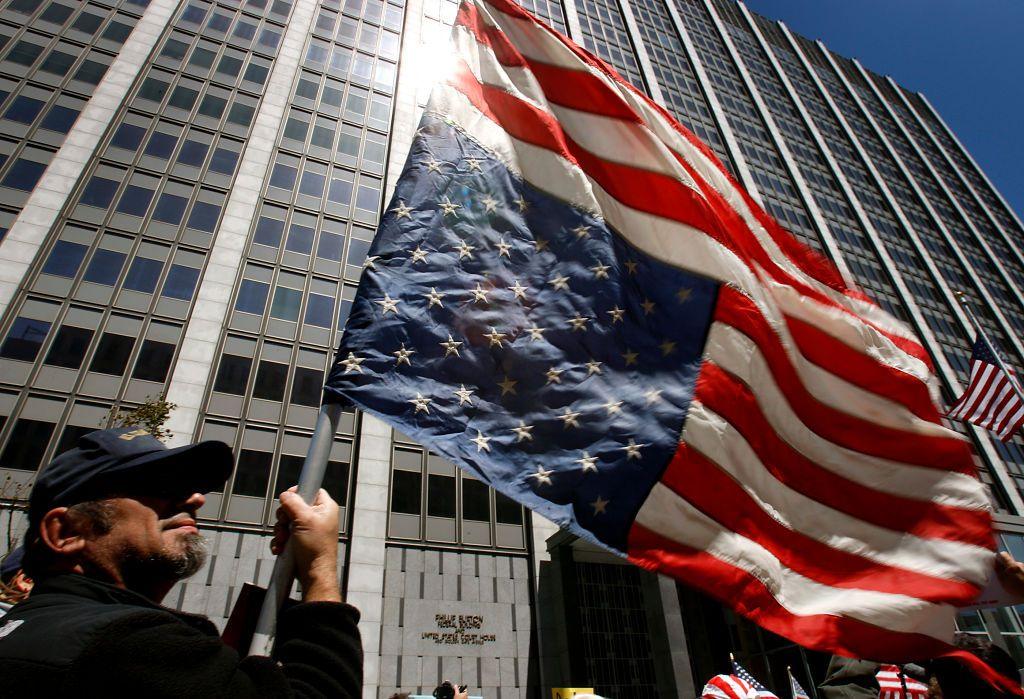Alito rejects call to skip Trump cases after flags row

Two flags with political connotations were seen outside homes owned by Supreme Court Justice Samuel Alito
- Published
US Supreme Court Justice Samuel Alito has rejected calls to remove himself from crucial election-year cases after a controversy over flags outside his homes.
Justice Alito, a conservative, said in a letter to Democratic senators that the flags in question had been flown by his wife.
An upside-down US flag and a pine tree, or 'Appeal to Heaven', flag were pictured outside his home in suburban Virginia and a holiday home in New Jersey.
Both were carried during the US Capitol riot of 6 January 2021, when supporters of Donald Trump stormed Congress.
Justice Alito said the matter did not affect his impartiality in cases involving Mr Trump and Capitol rioters.
“My wife is fond of flying flags,” he wrote in a letter to two senators who asked him to remove himself from key cases. “I am not.”
Justice Alito said the upside-down US flag, which is sometimes used to signify distress, was raised by his wife, Martha-Ann Alito, after a dispute with neighbours in January 2021 – shortly after the US Capitol riot.
“As I have stated publicly, I had nothing whatsoever to do with the flying of that flag,” Justice Alito wrote.
“I was not even aware of the upside-down flag until it was called to my attention. As soon as I saw it, I asked my wife to take it down, but for several days, she refused.”

Mrs Alito with President George W Bush as her husband was sworn in in 2006
The New York Times, which first reported on the upside-down flag, published a blow-by-blow account of the neighbourhood dispute on Tuesday.
According to the paper, a local couple put signs outside their home with messages including “Trump Is a Fascist” and “You Are Complicit” and another about Mr Trump that included a profanity.
The couple and the Alitos exchanged words several times. Justice Alito told Fox News that he and his wife were on a neighbourhood walk when a male outside the home with the Trump signs directed an obscene epithet at them.
At one point police were contacted, the newspaper said, but no crime was recorded and no arrests made.
Justice Alito said in his letter on Wednesday that his wife "was greatly distressed at the time due, in large part, to a very nasty neighbourhood dispute in which I had no involvement".
The 'Appeal to Heaven' flag was seen outside the Alito holiday home more than two years later, in 2023. The Supreme Court justice said it was one of many historical, themed and sport team flags that his wife put up outside the house.
The pine tree flag dates to the American Revolutionary War and was flown by vessels outfitted by George Washington, said Ted Kaye, secretary of the North American Vexillological Association.
"It's a revered Revolutionary War flag," the flag expert said. And the pine tree itself was long seen as a symbol of New England.
But from around 2015, the Appeal to Heaven flag was "repurposed to represent Christian nationalism", Mr Kaye said. He was referring to a right-wing Christian movement that is often defined as a belief that America's values and identity should be rooted in Christianity.
House of Representatives Speaker Mike Johnson flew the pine tree flag outside his office. The banner also flew as part of a flag display on a plaza in San Francisco until city officials took it down over the weekend, local media reported.
According to the US Flag Code, a set of advisory rules about the display of the national banner, the American flag should only be turned upside down in the event of “extreme danger to life or property”.

Pro-Trump protesters hold the pine tree flag in Washington on 6 January 2021

A tax protester flies an upside-down American flag at a rally in 2009
After the flag stories emerged, Senators Richard Durbin and Sheldon Whitehouse, both Democrats, wrote to Justice Alito to ask him to remove himself from key cases that the Supreme Court is set to rule on.
The cases include a crucial ruling on whether Mr Trump has immunity from prosecution, and whether criminal charges of obstructing an official proceeding were properly used in Capitol riot cases.
The senators said that the justice had “created reasonable doubt about his impartiality” and that “his recusal in these matters is both necessary and required”.
But in his response, Justice Alito - who was appointed in 2006 by Republican President George W Bush - said the two incidents did “not meet the applicable standard for recusal”.
A clause in the US Constitution says a judge "shall disqualify himself in any proceeding in which his impartiality might reasonably be questioned". The decision is up to Supreme Court justices themselves to make.